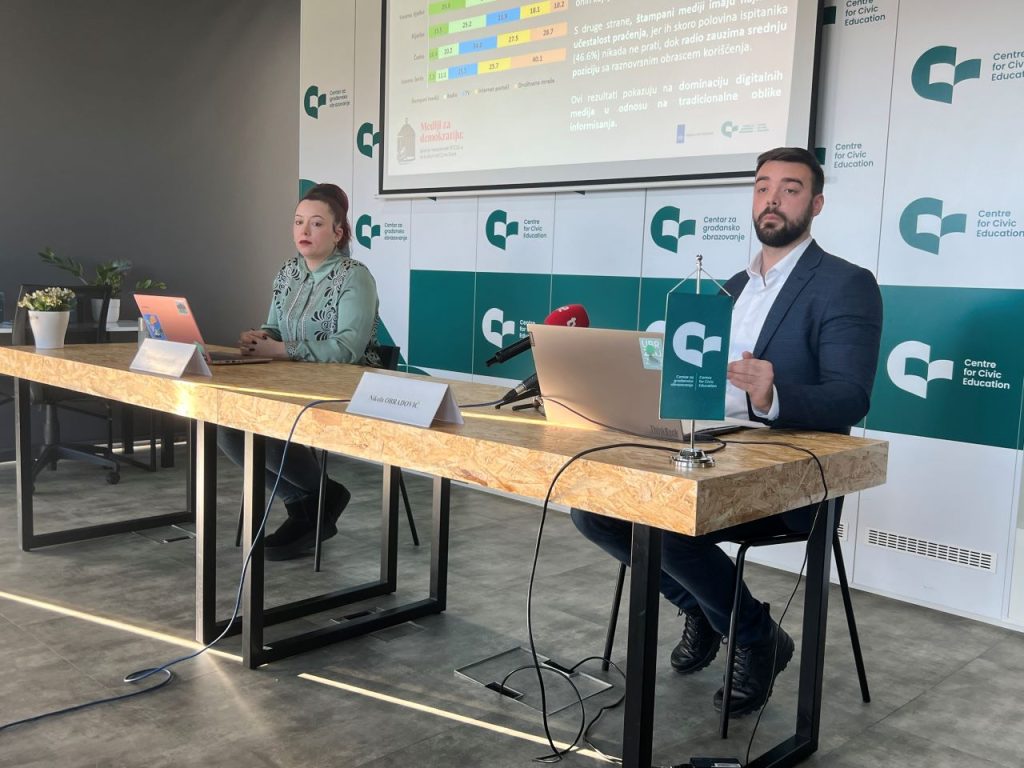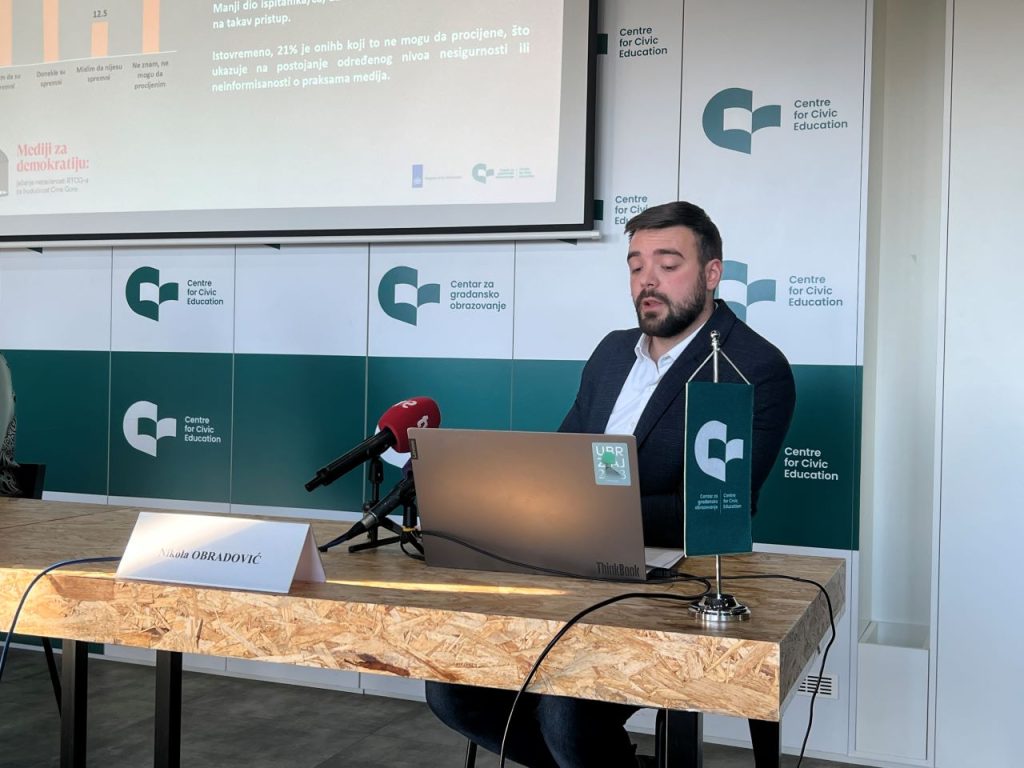“Political orientation of the media significantly shapes their reporting style, and media often deliver verdicts before courts do. Few people believe in full media independence. Additionally, there is a widespread belief that RTCG is susceptible to political influence, yet it also demonstrates a certain level of professionalism in its work,” are some of the findings from the public opinion survey on citizens’ perceptions of the media in Montenegro, presented today by the Centre for Civic Education (CGO) as part of the project Media for Democracy: Strengthening RTCG’s Independence for Montenegro’s Future, supported by the Ministry of Foreign Affairs of the Kingdom of the Netherlands.
“The research findings indicate that digital media, particularly social networks and online portals, have become the dominant sources of information in Montenegro. Television still holds significant influence, radio maintains moderate popularity, while print media are ranked the lowest, with a large number of citizens not reading newspapers at all,” said Nikola Obradović, Programme Associate at CCE, during the presentation of the survey findings.
Informative-political content is the most followed, then entertainment and sports, while documentary, cultural, and educational content is significantly less consumed.
“Key constraints on media performance, according to citizens, include the influence of media owners’ political orientation and government interference in investigative journalism. Opinions on media professionalism are divided, hence, 42% believe the media adhere to ethical codes and fact-checking, while a similar number feel the media do not prioritize truth (39.5%), impartiality (36.5%), and public interest (34%). This impression is further supported by the fact that 34.9% think Montenegrin media often render verdicts before the courts,” Obradović noted.
When significant events occur in Montenegro, most citizens (54.5%) turn to multiple TV channels for information. “In such cases, the public broadcaster remains the most important individual source for 29% of respondents, while 16.5% follow other TV outlets such as TV Vijesti, NOVA M, Prva, or Pink. Internet portals are key for practical daily life information (28.5%), followed by friends and acquaintances (23.8%) and electronic media like radio and television (23.2%). Social networks are used by 17.9%, while only 6% rely on print media,” Obradović explained.
There is a strong belief that media in Montenegro prioritize the interests of those with political and economic power and minority think citizens are the focus. Many respondents are unable to assess whom the media primarily serve. Consequently, political parties, economic power centres, and media owners are perceived as having significant influence over editorial policies.
The largest percentage of respondents believes that independence from political parties is crucial for truthful and impartial media reporting, followed by economic sustainability and professional skills of editors and journalists.
A majority of respondents (58.1%) believe that media literacy among Montenegrin citizens needs to be improved to better understand the information being presented.
A significant portion believes Montenegrin media are willing to publish sensationalist information that is unverified or insufficiently verified to boost circulation and ratings – 30.7% think they are willing, while 35.8% believe they are somewhat willing.
Almost two-fifths of citizens (39.9%) believe that source identification is very important.
Regarding the public broadcaster RTCG, the data shows that most respondents follow RTCG several times a week (35.7%), while 29.1% watch it daily, and 25.2% occasionally, but 10% state they never follow this media outlet. “When assessing RTCG’s mission, 60.6% of respondents believe it partially fulfills its role of reporting in the public interest. Over a quarter (28.5%) think RTCG fully fulfills this mission, while 10.9% believe it does not fulfill it at all,” Obradović stated.
“Opinions about RTCG are very divided. On one hand, there is high susceptibility of RTCG to political influence, which reflects on RTCG objectivity in reporting on socio-political events and lower level of trust in its independence. On the other hand, there is an assessment of a high level of professionalism in its work,” Obradović added.
The majority of respondents partially trust the information and content presented in RTCG’s news programmes (54.1%), with more than a quarter (27%) expressing full trust, while one in ten (10.9%) does not trust it at all.
“Surveyed citizens pay the most attention to news programmes (25.1%), followed by entertainment (20.3%) and sports programmes (19.5%) on RTCG. The majority (40.3%) assesses that RTCG does not produce enough educational content. Conversely, 27.5% think RTCG fully produces such content, while 32.1% believe it does not produce enough of educational programme at all,” Obradović pointed out.
“Respondents’ views on RTCG’s talk shows are divided: 30.4% think they bring together genuine dissenting opinions, 33.1% believe they mostly gather participants who agree with each other, while the largest percentage (36.6%) is undecided,” Obradović highlighted.
Over one-third of respondents (38.1%) follow RTCG’s portal, while 61.9% do not. Among those who do, most (65.5%) express partial satisfaction with the quality of content on RTCG’s website.
“Less than a third (31.6%) of respondents think RTCG partially treats all political structures and options in Montenegro equally, while 25% believe it does so fully. Conversely, 18.8% think RTCG gives preference to those in power, while only 3.2% believe it favors the opposition. A significant percentage of respondents (21.4%) have no opinion on this issue,” stated Nikola Obradović.
Regarding the assessment of impartial reporting, the majority (42.9%) believes RTCG partially reports without favoring certain groups or individuals, while 14.1% think it never shows favoritism. A negative view is held by 17.9% of respondents, who claim the broadcaster never reports impartially or without favoritism. Meanwhile, 25.2% of respondents cannot assess this issue.
There is no majority consensus that RTCG freely addresses public interest topics, especially those involving the shortcomings or scandals of influential figures. “While 34.2% believe RTCG freely opens such topics, 32.6% disagree, and a significant percentage (33.2%) state they do not know or cannot assess,” Obradović explained.
The survey was conducted from 16 to 23 December 2024, using the CAPI method, on a stratified random sample of 1,022 adult respondents. The DAMAR Institute provided expert support for the research.
Maja Marinović, Programme Associate



